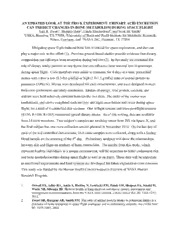
NASA Technical Reports Server (NTRS) 20140013320: An Updated Look at the Pro K Experiment: Urinary Acid Excretion Can Predict Changes in Bone Metabolism During Space Flight PDF
Preview NASA Technical Reports Server (NTRS) 20140013320: An Updated Look at the Pro K Experiment: Urinary Acid Excretion Can Predict Changes in Bone Metabolism During Space Flight
AN UPDATED LOOK AT THE PRO K EXPERIMENT: URINARY ACID EXCRETION CAN PREDICT CHANGES IN BONE METABOLISM DURING SPACE FLIGHT Sara R. Zwart1, Martina Heer2, Linda Shackelford3, and Scott M. Smith3 1USRA, Houston, TX 77058, 2University of Bonn and Profil Institute for Metabolic Research, Neuss, Germany, and 3NASA JSC, Houston, TX 77058 Mitigating space flight-induced bone loss is critical for space exploration, and diet can play a major role in this effort (1). Previous ground-based studies provide evidence that dietary composition can influence bone resorption during bed rest (2). In this study we examined the role of dietary intake patterns as one factor that can influence bone mineral loss in astronauts during space flight. Crew members were asked to consume, for 4 days at a time, prescribed menus with either a low (0.3-0.6 g/mEq) or high (1.0-1.3 g/mEq) ratio of animal protein to potassium (APro:K). Menus were developed for each crewmember, and were designed to meet both crew preferences and study constraints. Intakes of energy, total protein, calcium, and sodium were held relatively constant between the two diets. The order of the menus was randomized, and crews completed each set (low and high) once before and twice during space flight, for a total of 6 controlled diet sessions. One inflight session and three postflight sessions (R+30, R+180, R+365) monitored typical dietary intake. As of this writing, data are available from 14 crew members. Two subject’s samples are awaiting return from ISS via Space-X, and the final subject has one more collection session planned in November 2014. On the last day of each of the 4-d controlled diet sessions, 24-h urine samples were collected, along with a fasting blood sample on the morning of the 5th day. Preliminary analyses will show the relationships between diet and flight on markers of bone metabolism. The results from this study, which represent healthy individuals in a unique environment, will be important to better understand diet and bone interrelationships during space flight as well as on Earth. These data will be important as nutritional requirements and food systems are developed for future exploration-class missions. This study was funded by the Human Health Countermeasures Element of NASA Human Research Program. 1. Orwoll ES, Adler RA, Amin S, Binkley N, Lewiecki EM, Petak SM, Shapses SA, Sinaki M, Watts NB, Sibonga JD. Skeletal health in long-duration astronauts: nature, assessment and management recommendations from the NASA bone summit. J Bone Miner Res 28: 1243-1255, 2013. 2. Zwart SR, Hargens AR, Smith SM. The ratio of animal protein intake to potassium intake is a predictor of bone resorption in space flight analogues and in ambulatory subjects. Am J Clin Nutr 80: 1058-1065, 2004.
